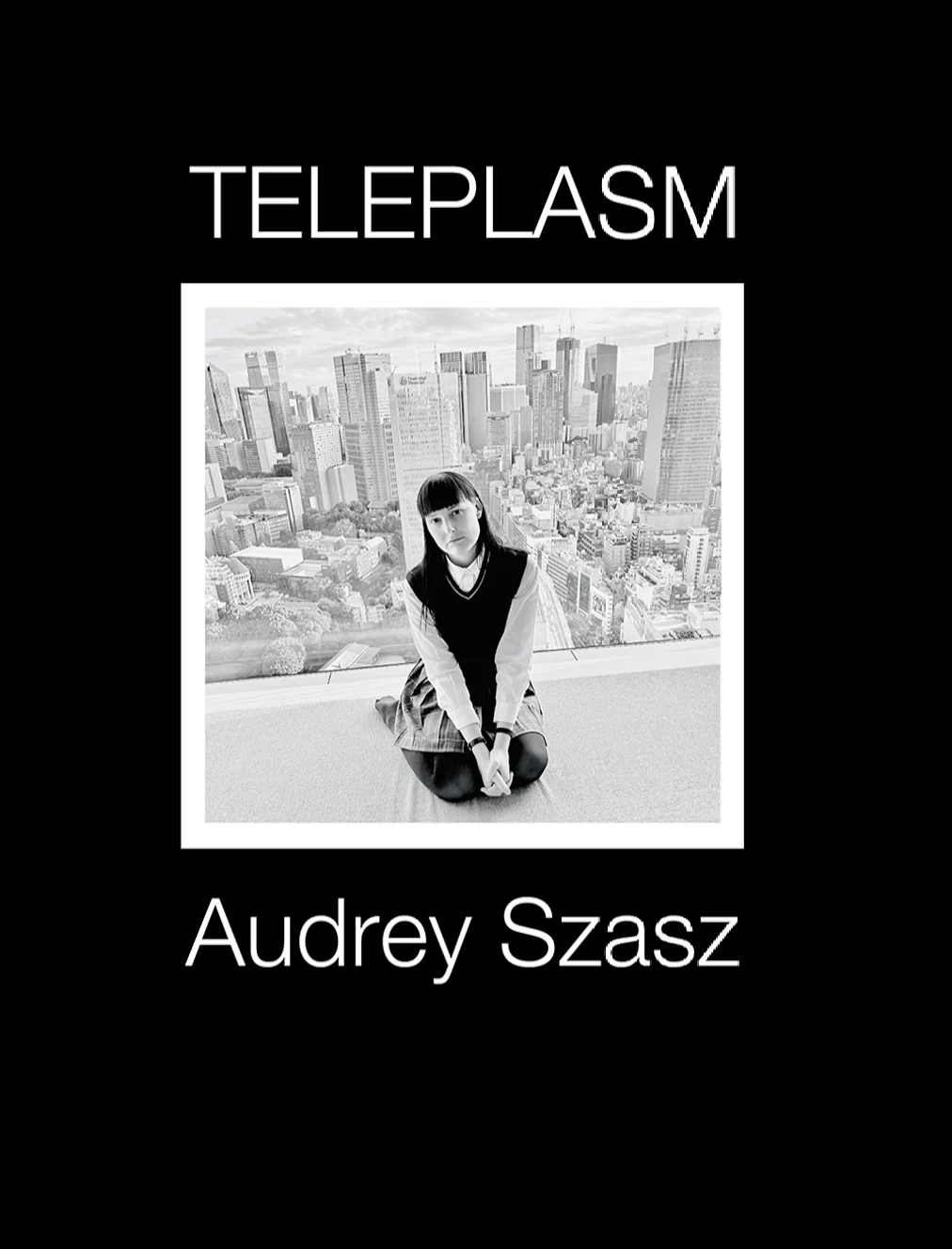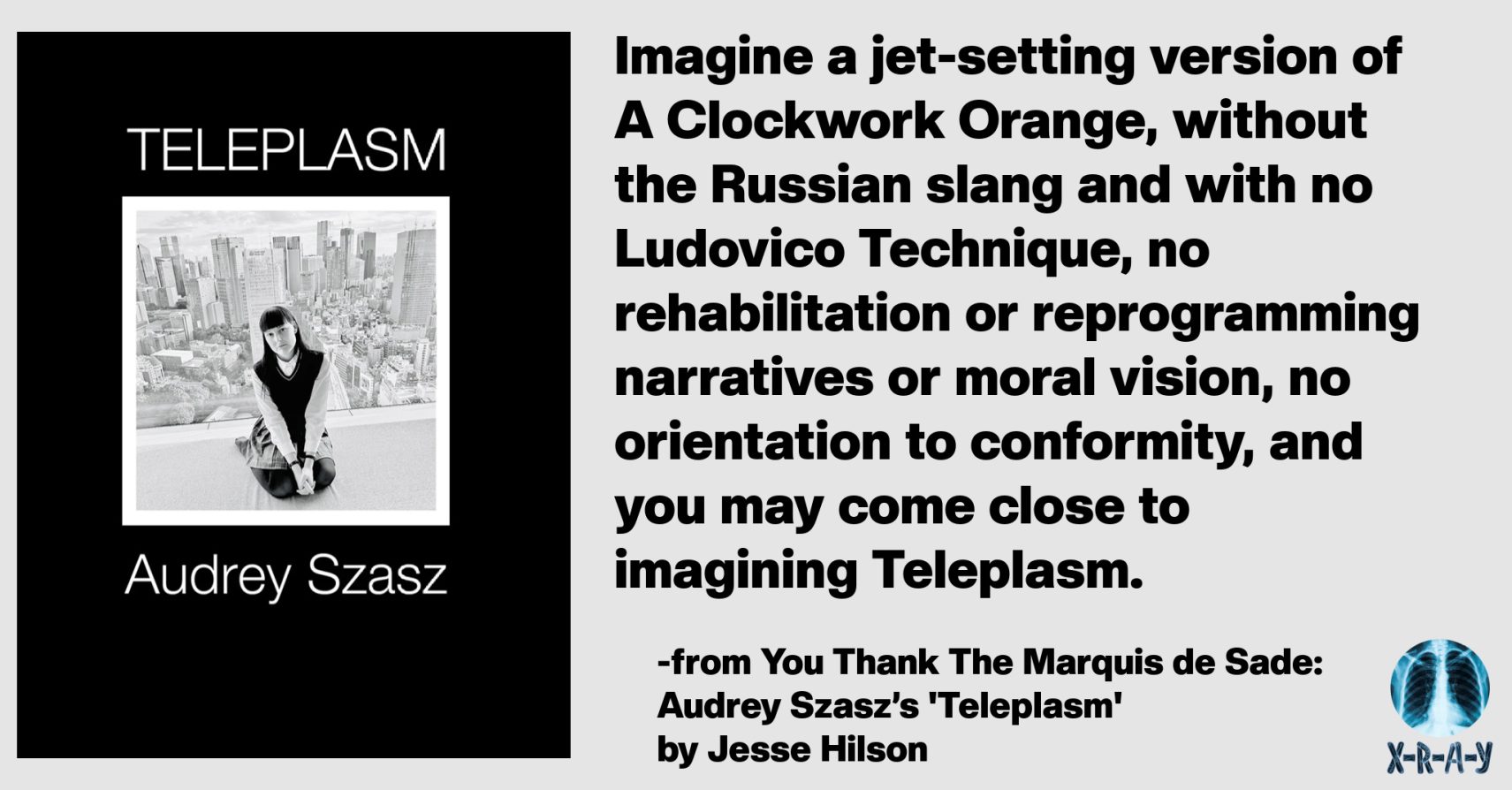 My dictionary of British slang tells me that “Sloane” was the first name of an insufferable female archetype of the upper class in the 1980s. When I saw that the protagonist of Audrey Szasz’s novel Teleplasm (Amphetamine Sulphate, 2025) was named Sloane Epstein it suggested great wealth and privilege crossed with echoes of the human trafficking, pedophilia, and white collar underworld of Jeffrey Epstein. Indeed, the novel exists in a narrative Petri dish of high-class travel, Internet media celebrity, psychological deterioration and pervasive sexual violence. Sloan Epstein is a young woman attached to a roving paranormal researcher Dr. Novák, her “boyfriend,” for whom she serves as a fraudulent medium on his globe-trotting YouTube investigations into hauntings and apparitions.
My dictionary of British slang tells me that “Sloane” was the first name of an insufferable female archetype of the upper class in the 1980s. When I saw that the protagonist of Audrey Szasz’s novel Teleplasm (Amphetamine Sulphate, 2025) was named Sloane Epstein it suggested great wealth and privilege crossed with echoes of the human trafficking, pedophilia, and white collar underworld of Jeffrey Epstein. Indeed, the novel exists in a narrative Petri dish of high-class travel, Internet media celebrity, psychological deterioration and pervasive sexual violence. Sloan Epstein is a young woman attached to a roving paranormal researcher Dr. Novák, her “boyfriend,” for whom she serves as a fraudulent medium on his globe-trotting YouTube investigations into hauntings and apparitions.
“Teleplasm,” on the book’s first page, is given as the title of a substance that hypothetically emanates from “the body of a medium that serves as the means for telekinesis.” Since nobody, especially Sloane, credibly believes in the fiction of the afterlife they are perpetrating, we as readers of the novel are left to witness her body’s other more tangible excretions in the form of aroused sexual response to Novák’s frequent physical and psychological abuse. Sadomasochistic sexual encounters come along with the punishing regularity of a city bus schedule, and are described with microscopic detail. More narration, though, is given to Sloane’s interior emotional landscape which is as weirdly terrifying as the darkest and most deranged true crime documentary offered on the planet’s most off-the-chain YouTube channel on the eve of its being taken down for obscenity. In fact, this monologued material—morbid, funny, shocking, unrepentantly antisocial—makes up the bulk of Szasz’s novel:
My wish for affection is part of a larger neurotic trend, put in motion by an artificial hand or a silent motor—eternity is an unwound thread from an invisible spool—…and what am I doing right now? I am imitating a masochistic patient who longs to be trussed up in my cell like a worm in ever-tightening restraints, disobeying verbal and written commands, slacking off, twisting and turning, prophylaxis as state oppression, I need to please a white man, a clearly ironic overtone of hypergenocidal mania, sexual relations with my oppressors, analysts, teachers, furtive incest wishes, involuntary recall of trauma injuries, furious self-flagellation that never seems to satisfy…
Imagine a jet-setting version of A Clockwork Orange, without the Russian slang and with no Ludovico Technique, no rehabilitation or reprogramming narratives or moral vision, no orientation to conformity, and you may come close to imagining Teleplasm. The narrator’s voice (this is a common feature of all Szasz’s fiction that I’ve read) is overpowering: sophisticated and urbane while at the same time uniquely dissolute and down for whatever, including felonious criminal behavior and flouting all forms of authority. This makes for a fascinating window onto her characters. The boundaries broken are both external and internal. Szasz’s narrators dare you to develop something as frail and weak as a moral objection, or a set of stupid moral reactions, to their litanies of outrage and danger.
 I had opened myself up to Teleplasm maximally, so the book stood for something significant, to me. I could play along with the morbid curiosity. When I read it, though, I felt like “There, I’ve read enough of the evil.” A good book in many ways, an evil book in a big way, in the biggest way. Teleplasm should not be banned as a matter of policy, but if you’re looking for books that from an enlightened and amused perspective “might as well be banned,” banned by a smirking individual, not a humorless, illiterate group, banned for one’s self, this is something like that book. It is a turn-off for all further books of its type about that kind of moral degeneracy. And there are a lot of books of the type out there, but none as well-written as Teleplasm, I’d wager. In it, I have found the book that has done the turning off for me. Szasz’s cool, black book has pride of place in my library.
I had opened myself up to Teleplasm maximally, so the book stood for something significant, to me. I could play along with the morbid curiosity. When I read it, though, I felt like “There, I’ve read enough of the evil.” A good book in many ways, an evil book in a big way, in the biggest way. Teleplasm should not be banned as a matter of policy, but if you’re looking for books that from an enlightened and amused perspective “might as well be banned,” banned by a smirking individual, not a humorless, illiterate group, banned for one’s self, this is something like that book. It is a turn-off for all further books of its type about that kind of moral degeneracy. And there are a lot of books of the type out there, but none as well-written as Teleplasm, I’d wager. In it, I have found the book that has done the turning off for me. Szasz’s cool, black book has pride of place in my library.
When I first read it, I gave it a five-star Goodreads review, deservedly, but on a personal evaluative basis, as a reader, it’s something I didn’t know if I ever wanted to read again. But I did read the book, again, later, months later, to taste and savor the moral viewpoints upon reflection. Part of this faculty of judgment was arrived at by reading several of Szasz’s novels and novellas, and feeling like I had seen enough of the progression of subject matter to get the picture and not needing to go further. I’m not 100% sure there’s much more depth to the cistern than what I saw from Counterillumination, Invisibility: A Manifesto, “A-Z of Robomasochism,” and finally Teleplasm. Szasz has written numerous other books that if one had extra cash and a desire to read further (itself a species of masochism, arguably), one could buy those books and explore it all. It feels like a case of clever craftsmanship and enfant terrible wit utilized on subject matter with diminishing returns.
This repulsion is “satisfying” in a way, a sad satisfaction for a reader. Sad that it was necessary. But happy too, in that I can move on to investigating other moral territories in literature. It drove me, in a sense, out of Dennis Cooper’s best-of lists at year’s end and into the arms of …some more positive sensibility. I don’t know the Marquis de Sade enough to place him, but you thank Sade, you thank him for drawing the boundary. I no longer believe for me “there is no boundary.” Szasz, and in one sense, Sade as one of her influences as a writer of S&M erotica and venom spat into the collective face of the squares, illustrated that, not for themselves or for their thirsty, depraved readers, but for me. And I’m just one reader and nobody to heed. I might as well, however, find a philosophy or a utility in Teleplasm. It provides a service, an aesthetic object lesson: an example of morality and aesthetics meeting perfectly in a novel. If it’s a Sadean thing, I wouldn’t say it draws me closer to reading the French aristocrat. Notoriety is only so compelling — beyond a certain point it has no power over “good people,” people with some orientation, as Joris-Karl Huysmans found after writing his own horrid books, towards the Cross. I hate to sound like a Midwestern mom at a school board invoking Satanic Panic. I don’t think that’s me.
I don’t know if I need to read more Audrey Szasz in a quest to gain the forbidden knowledge. And I don’t think this was ever her goal as a writer. The thing about quitting reading her for the kicks is that there is always the world’s horror reportage of its own evil you can turn to. Artists can give you so much of the picture and are in the end, interchangeable with each other. Szasz’s writing was a unique piece of the puzzle; her books, if they were living things, would have zero remorse, zero pangs of conscience about their capabilities. If there was a satirical vein in Teleplasm meant to invite a more complex moral reading, it was too Baroque for me to detect. Maybe I was too much of an obtuse normie to read, in the comedy of Sloane Epstein’s monologues, some cry for help, something about the need for love? It is a damaging, upsetting watershed of a book. I don’t think I’m interested in that kind of damage anymore. I could have gone on reading other transgressive and nihilistic authors forever, presumably. Again, I’m grateful to Teleplasm’s author for helping me to shut off the nozzle.
The Marquis de Sade, it seems to me, served as a “necessary outlier” to position other philosophical, moral, and literary coordinates around, against which normalized values can and must be established. And yet the world seems by some lights (whether subjective or objective, whether localized perceptions or mediated global consciousness) to be well on the way to becoming more Sadean every day, not so much of an outlier anymore. Maybe here’s another value of Teleplasm. It’s a dishonest, ill-equipped critic who hasn’t read Sade yet invokes him, but I don’t really need to read him to get this: I have Audrey Szasz’s updated writing.

